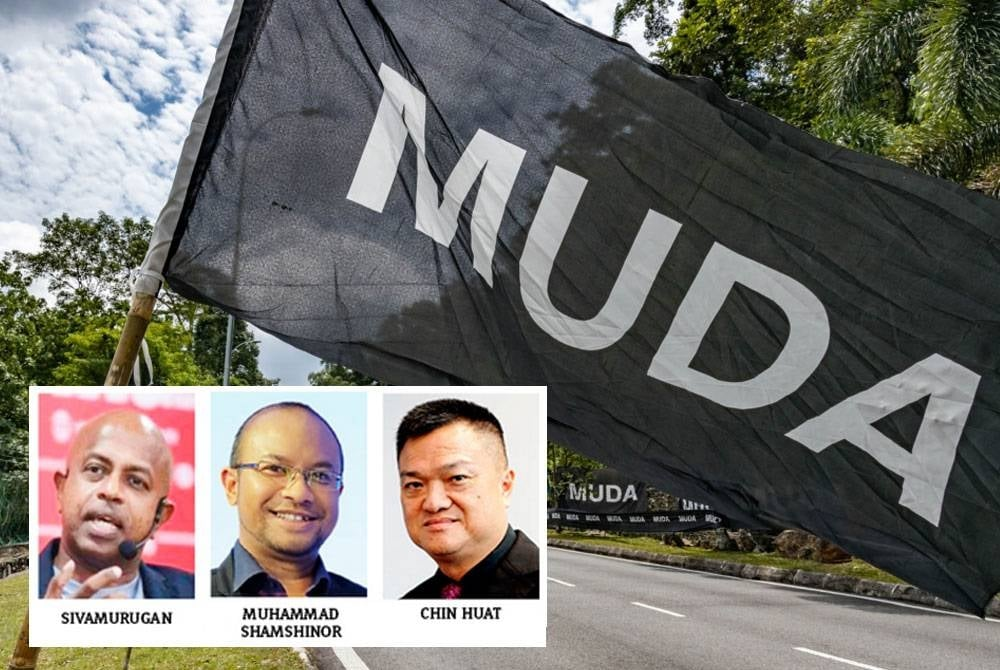Muda needs to join PH-BN or PN to survive
MOHD FAIZUL HAIKA MAT KHAZI
SHAH ALAM – Malaysian United Democratic Alliance (Muda) has only two options to ensure the party's survival after they faced a heavy defeat in the recent state elections involving six states.
The two options are to either return to the Pakatan Harapan (PH) coalition that cooperates with Barisan Nasional (BN), or join Perikatan Nasional (PN).
Political Sociology Lecturer from Universiti Sains Malaysia, Professor Datuk Dr Sivamurugan Pandian believes that if they do not do so, Muda will be suppressed if they continue to experiment or try their luck to run solo in the 16th General Election (GE16) while the current politics of the country is dominated by only two coalitions of major political parties namely PH-BN and PN.
Sivamurugan also suggested that Muda finds the best solution and identifies new offers to ensure it remains relevant and thus be able to make a significant contribution in the country's political arena.
"Muda needs to unearth more young leaders who can lead, especially the young voters and are not just relying on its President, Syed Saddiq Syed Abdul Rahman alone.
"This is because in the eyes of the people now, Muda is Syed Saddiq. So Muda needs to identify more individuals, especially in strategic areas in each state as an initial preparation for GE16," he told Sinar Premium.
In the recent state polls, Muda's solo participation turned out to have a bad ending when the party lost badly and lost deposit in all 19 state seats contested.
At the moment, there are only two young leaders who won in the last election, namely Syed Saddiq as Muar MP and his secretary-general, Amira Aisya Abd Aziz who was appointed as Puteri Wangsa MP during the Johor state election in February 2022.
Meanwhile, political analyst from the University of Malaya, Dr Muhammad Shamsinor Abdul Azzis said if Muda continues with the 'go solo' policy, they will most likely lose all state and parliamentary seats contested in the upcoming GE16.
"Syed Saddiq needs to immediately hold discussions with representatives of the PH-BN and PN coalition to allow Muda to be given more space to contest in GE16 later.
"Muda also needs to develop more authoritative leaders other than Syed Saddiq and Amira Aisya to expand the influence of the party further," he said.
REFORMATION
Asia Office Deputy Head (Strategy), UN Sustainable Development Solutions Network (SDSN-Asia) at Sunway University, Professor Wong Chin Huat believes that Muda needs to carry out two drastic reforms to remain relevant.
"First, establish headquarters and nurture local leaders in Kelantan (the lowest voting rate), Terengganu (no opposition) and Kedah (the most pluralistic among other three Pas states) to offer an alternative voice to young people other than PN, PH-BN and Pamu ('I'm lazy to vote' Party).
"Secondly, Muda needs to fight for the reform of the electoral system to increase the Party List-Proportional Representation seat so that voters can continue to vote for the party and at the same time return local government elections," he said.
Commenting on Muda's defeat, Chin Huat does not see that the party led by Syed Saddiq will continue to sink, but rather will continue to remain relevant.
He said Muda realised that even if they joined PH, they might not be given a seat following PH's compromise with its new partner, BN.
"Therefore, to maintain survival, Muda must organise a strategy to steal votes not only from PH but also PN and Pamu.
"Muda's defeat is also not surprising because the 'First-Past-The-Post' election system encourages voters to focus their votes on the two main party coalition candidates, PH-BN and PN only, rather than Muda that has only been one year old," he explained.










